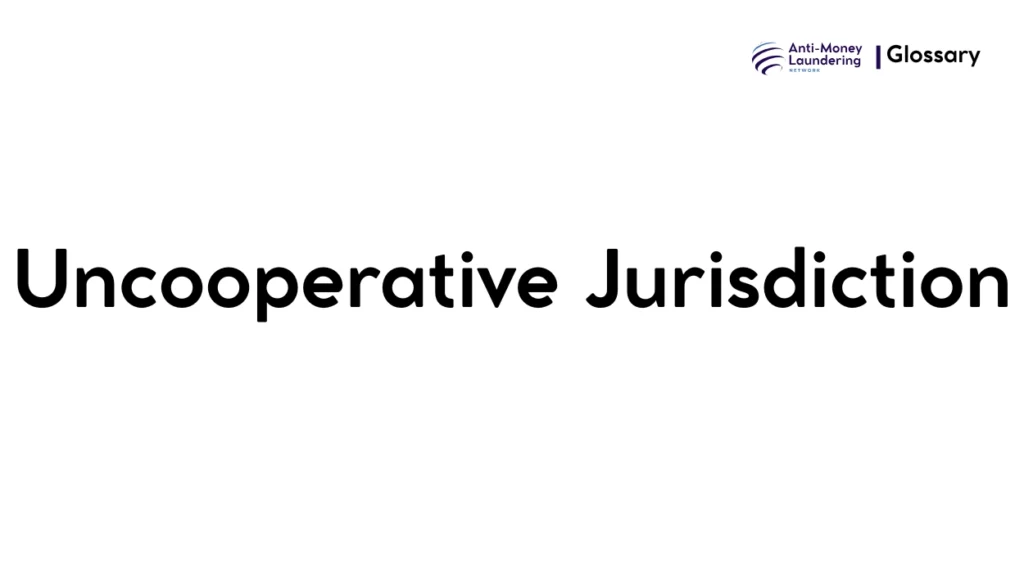Definition
An Uncooperative Jurisdiction in AML terms refers to a country or territory that fails to comply with internationally recognized Anti-Money Laundering and Counter-Terrorist Financing (AML/CFT) standards, demonstrating insufficient regulatory frameworks, weak legislative measures, or poor cooperation with international bodies like the Financial Action Task Force (FATF). These jurisdictions often lack effective AML legislation, supervisory transparency, and mechanisms necessary to detect, prevent, and punish money laundering activities.
Purpose and Regulatory Basis
The concept of Uncooperative Jurisdiction is pivotal in the global AML framework because such jurisdictions present heightened risks of facilitating illicit financial flows, money laundering, and terrorist financing. Identifying and listing such jurisdictions help international regulators and financial institutions target efforts to mitigate risks and apply enhanced due diligence.
Key global and national regulatory frameworks underpinning this concept include:
- FATF Recommendations: FATF publishes public lists identifying jurisdictions with strategic AML/CFT deficiencies, commonly known as “blacklists” and “grey lists.” These lists aim to pressure jurisdictions to enhance compliance.
- USA PATRIOT Act: Includes provisions restricting financial transactions with certain jurisdictions and entities identified as non-cooperative for AML purposes.
- EU Anti-Money Laundering Directives (AMLD): Require member states to implement enhanced customer due diligence measures concerning transactions involving high-risk third countries, including uncooperative jurisdictions.
These frameworks ensure coordinated international responses to jurisdictional vulnerabilities that could undermine the global financial system’s integrity.
When and How It Applies
Real-world use cases and triggers for classification include:
- Jurisdictions failing to enact or enforce adequate AML laws or supervisory controls.
- Countries with significant deficiencies in combating terrorist financing.
- Refusal or failure to cooperate with international AML assessments or mutual legal assistance requests.
Financial institutions reference these classifications when assessing country risk during customer onboarding, international transactions, correspondent banking, and investment decisions. For example, a bank transacting with an entity based in a jurisdiction on the FATF blacklist must apply enhanced due diligence or consider terminating relationships.
Types or Variants
Uncooperative jurisdictions are often classified into variants based on severity and progress:
- Prohibited Jurisdictions: Countries presenting ongoing and substantial AML/CFT risks with persistent strategic deficiencies and lacking remedial action.
- Restricted Jurisdictions: Those rated as non-compliant or partially compliant but which may be making some progress in addressing deficiencies.
These distinctions affect how financial institutions and regulatory bodies apply risk mitigation measures.
Procedures and Implementation
Financial institutions must implement stringent policies and controls to comply, including:
- Risk Assessment: Identify whether a transaction involves a customer or entity connected to an uncooperative jurisdiction.
- Enhanced Due Diligence (EDD): Apply stronger verification, ongoing monitoring, and scrutiny of transactions.
- Customer Acceptance Policies: Include criteria to limit or refuse business relationships involving high-risk jurisdictions.
- Transaction Monitoring Systems: Use automated tools to detect suspicious activities linked to uncooperative jurisdictions.
- Training and Awareness: Regular employee training on risks and compliance procedures.
- Reporting Obligations: File Suspicious Activity Reports (SARs) for transactions involving such jurisdictions.
Institutions also maintain records demonstrating compliance with these procedures for audit and regulatory review.
Impact on Customers/Clients
Customers connected to uncooperative jurisdictions may face:
- Enhanced scrutiny and verification requirements during onboarding and ongoing transactions.
- Restrictions or refusals when transacting or maintaining accounts with financial institutions subject to AML regulations.
- Delays and increased documentation demands, reflecting higher risk mitigation needs.
These measures protect the financial ecosystem but require institutions to balance compliance with fair customer treatment.
Duration, Review, and Resolution
The designation of uncooperative jurisdictions is dynamic:
- Regular Reviews: International bodies like FATF update their lists three times annually based on progress or deterioration.
- Resolution Pathways: Jurisdictions may improve frameworks and commit to action plans, leading to removal from high-risk lists.
- Ongoing Obligations: Financial institutions must continuously monitor changes and adjust due diligence accordingly.
Reporting and Compliance Duties
Institutions must document and report all interactions and transactions linked to uncooperative jurisdictions. Responsibilities include:
- Implementing formal policies aligned with regulatory standards.
- Filing required SARs and cooperating with authorities.
- Maintaining audits and evidence of risk assessments and controls.
- Facing penalties for non-compliance, which can include fines, reputational damage, or regulatory sanctions.
Related AML Terms
- High-Risk Jurisdictions: Often overlap with uncooperative jurisdictions; represent countries with elevated risks requiring enhanced due diligence.
- Enhanced Due Diligence (EDD): Heightened scrutiny processes mandated for customers/transactions involving these jurisdictions.
- Beneficial Ownership Transparency: Critical for understanding risks linked to entities in high-risk or uncooperative jurisdictions.
Challenges and Best Practices
Common challenges include:
- Ambiguity or frequent changes in listings creating compliance complexity.
- Balancing regulatory compliance with customer relationship management.
- Technical limitations in automated monitoring systems to identify all exposures.
Best practices include:
- Regular training and updates for compliance teams.
- Investing in robust AML software with jurisdiction filters.
- Developing clear, risk-based customer acceptance policies.
- Engaging in international cooperation and sharing intelligence.
Recent Developments
- Increasing use of technology and AI to detect transactions linked to uncooperative jurisdictions.
- Enhanced regulatory focus post-global sanctions regimes and evolving FATF criteria.
- Emergence of national lists in addition to FATF’s, such as the UK’s independent high-risk country list post-Brexit.
Uncooperative Jurisdictions represent a critical focus in AML compliance, reflecting countries that pose significant risks due to inadequate controls and poor cooperation. Financial institutions must rigorously apply risk assessments, enhanced due diligence, and maintain strong reporting and compliance frameworks to mitigate exposure. Staying updated on jurisdiction status and regulatory changes is essential to uphold the integrity of the financial system and fulfill global AML objectives.

